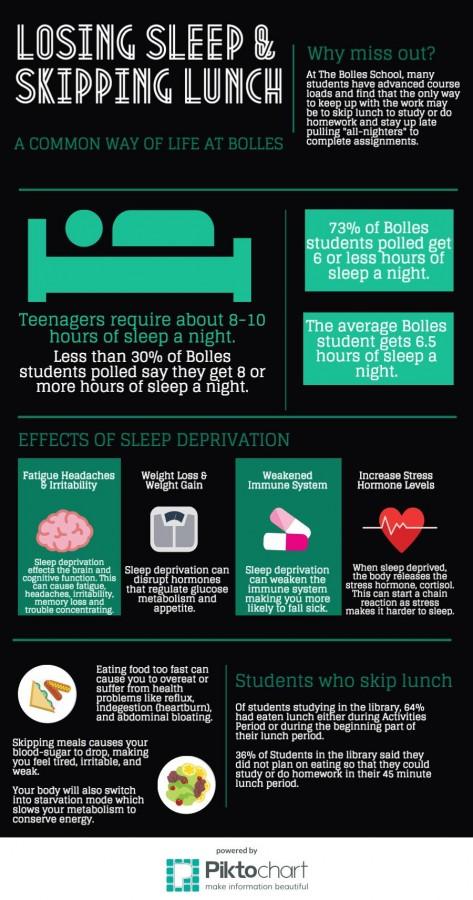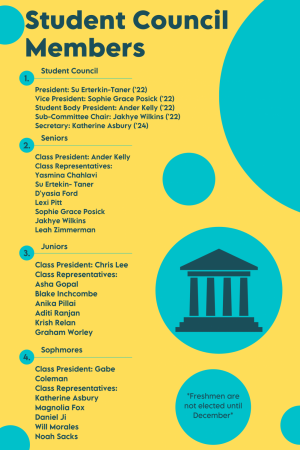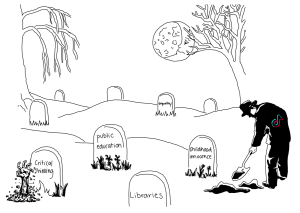I’ll Think of a Catchy Title When I’m not Tired
January 4, 2016
A classroom filled with yawning and growling stomachs. This is an image that is far too visible– and audible– here at Bolles- students of all ages and class-loads miss hours of sleep and skip meals in order to work as hard as they can.
According to Ms. Lange, the school librarian, it is common to see the same students in the library each day during lunch, when they should be eating their lunch. These students either eat at activities, eat far too fast, or wait until the end of the period for a rushed lunch– and according to Lange, even the teachers do it on occasion.
According to a survey of students in the library at lunch, eight out of fifteen students confirm that they skip lunch to do work, and do not necessarily eat “real” food, ie food not bought from, say, the bookstore. This is unsurprising when one looks at the work load given to students in all grades.
A prime example is the workload of Natasha Pillai (’17)– who said in a single breathless voice “Today, I literally had three bio labs due, and I had the English essay– yesterday I had a DBQ [Documents Based Question] in History, I had a math test, we had a debate in bio– we had a test in bio earlier this week but I wasn’t here on Tuesday and so I took it on Monday so that’s what I did over the weekend, I was studying for the test.”
When asked if she was excited for the break, she just exclaimed “Oh yes” in a drawn out way, and when asked how much much sleep she received on average, she said “I think it’s good when I get five hours, but this past week I only got a total of ten hours.”
Devon Haskell (’17) had similar qualms with the biology lab triple-threat, along with having to study for upwards of five hours on tests. When asked how she balanced the work-load, she simply said “I didn’t really balance it– I decided to wing it. I started working on the essay, like, two weeks ago, and then worked on it on Sunday, and finished the last two paragraphs last night.” Those two paragraphs took around five hours on their own, which gives a haunting reminder of what the “life” of an AP student is.
Isabella Array (’17) had an interesting answer when asked how she felt turning in the aforementioned English essay. “It was a mixture of, like, ‘Hooplah’ like look at me! I done good! But also a mix of ‘If I had done it earlier it would have been better’.” When asked if she felt the work-load was reasonable, she said “It’s unreasonable! Procrastination is a real thing!” in an infuriated voice likened to that of a viking berserker.
Seniors tended to skip lunch less than the underclassmen, which makes sense considering the fact that they receive free periods in which they can eat their food or do their schoolwork.
“I think we work you guys too hard,” said Lange when talking about the abundance of students missing their lunch period just to get their work done, “students should be talking with friends during lunch, not working.”
Lange also expressed regret towards the sleep deprivation– only four of the fifteen students interviewed slept more than seven hours a night, while the recommended daily minimum for teenagers is nine hours. Lange gives swimmers the chance to rest in the library if they want to, as they have to get to school at around five in the morning for practice.
Ms. Tyre, the school nurse, also commented on the presence of sleep deprivation. It is Tyre’s belief that the underlying cause of this sleep deprivation is simply procrastination– students aren’t getting their work done at reasonable times and are tormenting themselves by waiting until the last minute.
“It is easier to tell with the boarders,” Tyre said, talking about sleep deprivation, “because we know when they are getting to sleep, and when they are waking up.”
Tyre claims that if one wants to get a full night of sleep, they must “have the screens off an hour before bed,” referring to laptops, phones, tv’s, etc. This is actually similar to the advice given to those suffering from concussions, but it is universally applicable.
Both Tyre and Lange have a similar experience– Mondays are the busiest; in the library, every table is packed with sleepy students and, in the infirmary, students complain of headaches and exhaustion.
Lange and Tyre both discussed the negative aspects of this sleep deprivation and meal skipping– from antisocial behavior, to a weakened immune system, to an inability concentrate.
One thing is clear from all of this information; Bolles students almost universally have issues getting enough sleep and eating normally, and this needs to change for students to be happier and more successful overall.







